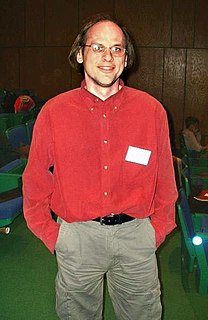A Quote by Robert J. Sawyer
The standard model of particle physics says that the universe consists of a very small number of particles, 12, and a very small number of forces, four. If we're correct about those 12 particles and those four forces and understand how they interact, properly, we have the recipe for baking up a universe.
Related Quotes
The main thing to understand about the current state of physics is that we have - are in some sense, a kind of victim of our own success. We have an incredibly successful theory called the Standard Model. And it really explains everything that we can observe about and in terms of a very small number of elementary particles and some basic forces between them. And it's a quite beautiful theory and it really is just absurdly successful.
The beauty of string theory is the metaphor kind of really comes very close to the reality. The strings of string theory are vibrating the particles, vibrating the forces of nature into existence, those vibrations are sort of like musical notes. So string theory, if it's correct, would be playing out the score of the universe.
I look up at the night sky, and I know that, yes, we are part of this Universe, we are in this Universe, but perhaps more important than both of those facts is that the Universe is in us. When I reflect on that fact, I look up — many people feel small, because they’re small and the Universe is big, but I feel big, because my atoms came from those stars.
Sexuality is a place where people are very vulnerable and can be experiencing and embodying very raw forces that they don't really understand and there's a question of how much you should control and how much you should play with those and what those forces really are, how you really feel about them. That's perennial.
The universe does not exist 'out there,' independent of us. We are inescapably involved in bringing about that which appears to be happening. We are not only observers. We are participators. In some strange sense, this is a participatory universe. Physics is no longer satisfied with insights only into particles, fields of force, into geometry, or even into time and space. Today we demand of physics some understanding of existence itself.
Mathematics is not only real, but it is the only reality. That is that entire universe is made of matter, obviously. And matter is made of particles. It's made of electrons and neutrons and protons. So the entire universe is made out of particles. Now what are the particles made out of They're not made out of anything. The only thing you can say about the reality of an electron is to cite its mathematical properties. So there's a sense in which matter has completely dissolved and what is left is just a mathematical structure.





































